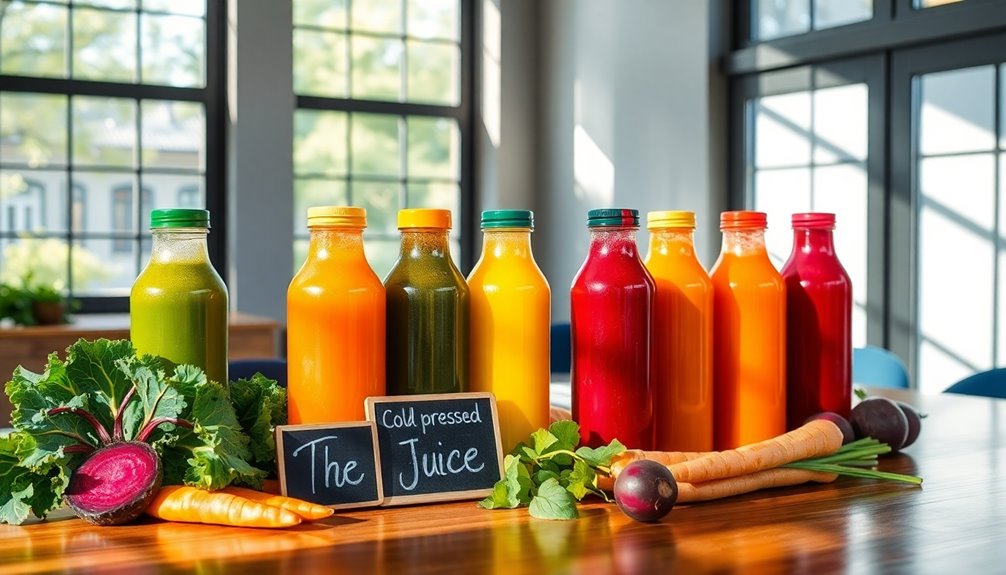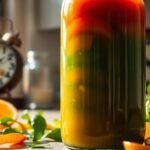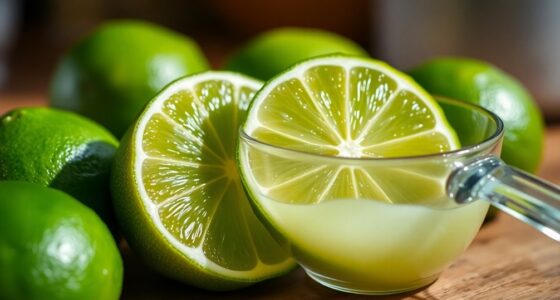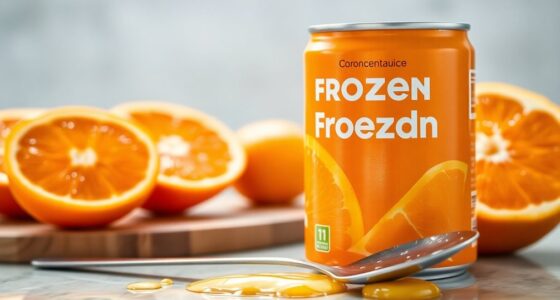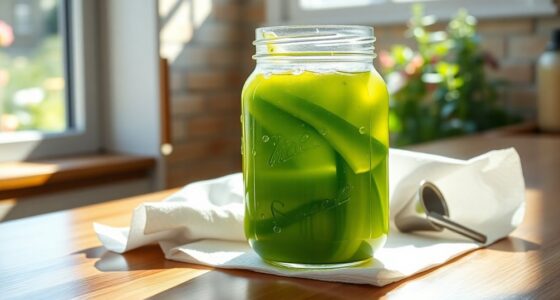Cold-pressed juice lasts about 3-5 days in your refrigerator if you store it properly at temperatures between 34-40°F (1. 6-4. 4°C). This keeps the juice fresh and preserves its nutrients, which is important since fresh juices can be a significant investment. If you need it to last longer, freezing can extend its shelf life to 6-12 months. But there’s more to know about keeping your juice fresh, so stick around to discover additional tips! To maximize the freshness of your cold-pressed juice, consider using airtight containers to minimize exposure to air. Additionally, some people may wonder about the canned tomato juice shelf life; typically, unopened canned tomato juice can last for 1-2 years in your pantry. However, once it’s opened, it’s best to consume it within 5-7 days for optimal flavor and safety. Always check for any signs of spoilage before consuming, regardless of the type of juice you have.
Key Takeaways
- Cold-pressed juice lasts 3-5 days when stored properly in the refrigerator at 34-40°F (1.6-4.4°C).
- Freezing extends the life of juice to 6-12 months, but quality may gradually decrease over time.
- Consume unrefrigerated juice within 8 hours to maintain nutrient content and avoid spoilage.
- Signs of spoilage include separation, dull color, a fermented smell, or mold presence.
- Adding natural preservatives like lemon juice can help extend freshness and maintain quality.
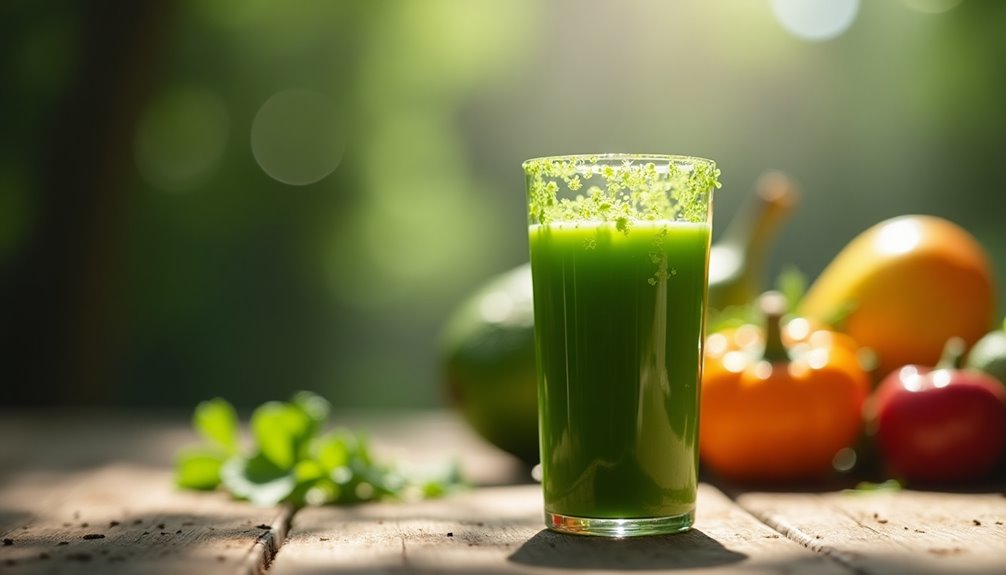
When it comes to cold-pressed juice, knowing how long it lasts can save you from wasting your fresh investment. Cold-pressed juice typically has a shelf life of 3-5 days when you store it properly in the refrigerator, keeping it at temperatures between 34-40°F (1.6-4.4°C). This short timeframe highlights the importance of proper storage to maintain the nutrient content and freshness of your juice. If you've just paid good money for fresh juices, you definitely want to enjoy them at their best!
If you're considering a longer-term option, freezing your cold-pressed juice is a game changer. When stored in airtight containers, frozen juice can last anywhere from 6 to 12 months. This method prevents oxidation and moisture loss, ensuring that you can enjoy that fresh taste even months later. However, remember that the quality may gradually decrease over time, so it's best to consume it sooner rather than later.
You might wonder how unrefrigerated juice fits into the picture. Ideally, you should drink cold-pressed juice within 8 hours of it being out of refrigeration. After this period, the vitamin C levels can drop significantly, making it less nutritious. So, if you're taking your juice on the go, try to drink it promptly to get the most out of its nutrient content.
It's essential to familiarize yourself with the signs of spoilage, too. If you notice separation, dull color changes, or a fermented smell, it's a clear indication that your juice has gone bad. Mold is another warning sign, and if you see it, discard the juice immediately for safety. Consuming spoiled juice can lead to unpleasant gastrointestinal issues, so better safe than sorry!
To help extend the freshness of your cold-pressed juice, consider adding natural preservatives like lemon juice. This can add a bit of tartness while also keeping your juice fresh for a few extra days. The citric acid in lemon juice acts as a natural preservative, which can be particularly useful if you want to enjoy your juice for a bit longer.
Another method to preserve the quality of your cold-pressed juice is High Pressure Processing (HPP). This technique uses high pressure to eliminate harmful bacteria without compromising the nutritional value or taste. While HPP extends the shelf life even further, not all juices go through this process, so check the label if you're interested.
Frequently Asked Questions
How Long Can You Keep Pressed Juice in the Fridge?
When you store pressed juice in the fridge, you can typically keep it for about 3-5 days.
Make sure it's sealed tightly and kept at a temperature between 34-40°F (1.6-4.4°C) to maintain its freshness.
Keep an eye out for signs of spoilage, like a grayish color or strong smells, which mean it's time to toss it.
For the best flavor and nutrients, try to drink it within the first 72 hours.
How to Tell if Cold-Pressed Juice Is Bad?
To tell if your cold-pressed juice is bad, look for signs of spoilage.
If you notice separation, brown foam, or sedimentation, it's likely oxidized. A grayish or dull color indicates it may be spoiled, and you should avoid drinking it.
Strong, fermented smells suggest degradation, while mold on the surface is a definitive sign to discard it immediately.
Always trust your senses; if something seems off, it's best not to consume it.
How Long Does Homemade Juice Last?
You've just crafted liquid gold in your kitchen! But how long does it really last?
If you store it properly in the fridge, you've got about 2 days of vibrant, nutrient-packed goodness.
Want to extend that magic? Freeze it in airtight containers, and you could savor it for up to a year!
Just remember, if it's been sitting out for more than 8 hours, you might as well be sipping on disappointment.
How Do You Make Cold-Pressed Juice Last Longer?
To make your cold-pressed juice last longer, store it in airtight glass containers and fill them to the brim to minimize air exposure.
Keep your juice refrigerated between 35-40°F to slow down nutrient loss and prevent bacteria.
Consider adding a splash of lemon juice, which acts as a natural preservative.
For extended storage, freeze the juice in small portions, ensuring you use proper airtight containers to avoid moisture loss.
Conclusion
In the end, the lifespan of your cold-pressed juice hinges on a few factors. If you store it properly in the fridge, it can last up to 72 hours, but what if you accidentally leave it out? The clock starts ticking the moment you open that bottle. Will you take the chance and risk losing those vital nutrients? Keep that juice cold and consume it fast—your health may depend on it! Don't let it go to waste!
Cindy thoroughly researches juicing trends, techniques, and recipes to provide readers with practical advice and inspiration. Her writing style is accessible, engaging, and designed to make complex concepts easy to understand. Cindy’s dedication to promoting the advantages of juicing shines through her work, empowering readers to make positive changes in their lives through the simple act of juicing.

